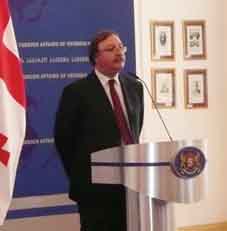Russia returns to Geneva talks
By Temuri Kiguradze
Wednesday, May 20

Russia had left the talks in support of the separatist Abkhazian and South Ossetian delegations, who refused to participate in the negotiations because Ban Ki-moon’s report on the situation in the Georgian conflict zones had not been produced by the previously agreed deadline of May 15. Abkhazian representatives noted then that they would not return to the talks until they had made sure that Abkhazia was not mentioned as the part of Georgia in the report. All previous reports by the UN General Secretary had been entitled “On the situation in Abkhazia, Georgia,” however according to the Russian delegation the May 19 report is called “Report of the Secretary-General, pursuant to Security Council Resolutions 1808, 1839 and 1866.”
Georgian Foreign Minister Grigol Vashadze confirmed that the title of the report “was a compromise decision” and stated that Georgia was not “very satisfied with this compromise.” The full text of the report has not been made public yet; however Reuters news agency notes that the report doesn’t mention clearly whether Abkhazia is a part of Georgia or not.
“I am not very satisfied with this compromise, but this compromise also cannot be a source of satisfaction for Moscow,” Grigol Vashadze told journalists in Georgia. “Georgia will never allow Russia to legitimize two virtual Bantustans which it has created on Georgian territory,” he added, noting that “Russia’s goal is clear – to kill the UN mission, like it did the OSCE mission, as Russia does not want to have witnesses of its violations of the ceasefire agreement.”
“The [Ban Ki-moon's] report does not call the territorial integrity of Georgia into question,” Georgian Ambassador to UN Kakha Lomaia said. "This report once again mentions the UN's commitment to the territorial integrity of Georgia. The report is based on the report of UN observers in the Gali and Ochamchire areas of Upper Abkhazia and in the regions of Samegrelo," he added.
According to Reuters the report recommended that security zones with no armed forces or military equipment be enforced in a 12 km area on both sides of the ceasefire line, and restricted zones with no heavy military equipment should extend for another 12 km beyond these. He also called for regular U.N. monitoring of conditions in the Kodori valley and regular meetings between Russian and Georgian officials to maintain calm and stability. “I hope that these efforts can lead to the establishment of a more stable security regime in the area,” Ban Ki-moon said on May 19. His report is an interim one and must be discussed at the UN Security Council on May 27.
Chair of the Georgian Parliament David Bakradze stated that the “main diplomatic struggle” will not be conducted now, but when the concrete resolution based on the report will be discussed at the UN. “The Georgian side will never agree to any document or format that will legalize the reality we have as the result of the Russian occupation. I hope that with the assistance of our friends and partner countries we will maintain the UN mission in way which will not contradict the territorial integrity of Georgia,” stated Bakradze on Tuesday.
The talks in Geneva have already been resumed. Abkhazian de facto Foreign Minister Sergey Shamba announced after Ban Ki-moon’s report had been received that “all obstacles to the continuation of negotiations have been removed.” On May 18, after Russia quit the Geneva talks, Tbilisi accused Moscow of a “demonstration of its long-set goal to obstruct the peace process in Georgia.”
Georgian conflict expert Malkhaz Chemia considers that not calling Abkhazia part of Georgia in Ban Ki-moon’s report “is no reason to panic.” “This compromise shows that the UN is a flexible structure and interested in the continuation of the negotiations between the Georgian and Abkhazian sides. As we know, because of this report the Abkhazians returned to the Geneva negotiations,” Chemia told The Messenger on May 19. However he believes that continuing to not state that Abkhazia is part of Georgia may lead to “unpleasant consequences” for Georgia.
The discussions in Geneva are the fifth round of negotiations about security in the Georgian conflict zone. The first round was conducted on October 15, 2008, as the part of the EU-mediated ceasefire agreement signed after the August 2008 Russian-Georgian war, which resulted in Russia recognising the independence of Georgian breakaway regions Abkhazia and South Ossetia.
